Overview
Real-world evidence derived from Colombian medtech trials is increasingly acknowledged for its pivotal role in assessing the effectiveness and safety of medical devices within everyday healthcare environments. This evidence not only informs regulatory submissions and healthcare practices but also significantly enhances patient outcomes by offering insights into diverse treatment patterns and the long-term performance of medical technologies. Such insights are essential for driving improvements in clinical research and fostering collaboration among stakeholders.
Introduction
In the dynamic landscape of Colombian medical technology, real-world evidence (RWE) emerges as a cornerstone for clinical trials, offering invaluable insights that transcend traditional research methods. By harnessing real-world data, stakeholders can evaluate the effectiveness and safety of medical devices in everyday clinical settings, thereby shaping future innovations and regulatory practices.
As Colombia positions itself as a pivotal player in the Medtech arena, understanding the implications of RWE becomes essential for driving advancements in patient care and regulatory compliance. This article delves into the significance of RWE in Colombian Medtech trials, exploring its impact on:
- Regulatory frameworks
- Recruitment strategies
- The overall success of clinical studies in the region
Understanding Real-World Evidence in Colombian Medtech Trials
Real-world evidence from Colombian medtech trials is becoming increasingly crucial in the field of medical technology. This evidence, derived from the examination of real-world data (RWD), encompasses information gathered beyond the confines of conventional trials. In Colombia, the traction gained by real-world evidence from medtech trials is significant, providing critical insights into the performance of medical devices within routine medical environments.
This evidence reflects diverse patient demographics, treatment patterns, and outcomes observed in everyday practice, all essential for understanding the long-term effectiveness and safety of medical devices. The utilization of real-world evidence (RWE) carries profound implications for regulatory submissions and patient care. For example, studies tracking patient outcomes post-introduction of a medical device yield valuable data that informs healthcare practices and directs future research pathways. Notably, Dr. Jorge Hernando Ulloa recently presented one-year first-in-human data on the VenoValve® at the Charing Cross International Symposium, underscoring advancements in vascular medicine and the pivotal role of RWE in evaluating device performance.
Recent statistics reveal that 90% of pharmaceutical companies now have dedicated RWE teams, indicating a growing recognition of real-world data's significance in decision-making processes. As articulated in Section 3011 of the 21 Century Cures Act, "The goal of these data is to inform the FDA about the impact of a disease or therapy on patients as well as patient preferences." This underscores RWE's influence on regulatory frameworks and healthcare practices.
In Colombia, utilizing real-world evidence from medtech trials is particularly significant, allowing for a detailed assessment of medical device effectiveness. Collaborating with local experts is vital to evaluate the strengths and limitations of RWE in this context, ensuring the data collected remains both relevant and comprehensive.
Moreover, bioaccess® is dedicated to ensuring information security and client trust through robust data protection measures. The organization has instituted grievance and data protection protocols to address client concerns regarding compliance and transparency, thereby enhancing the integrity of research studies. Furthermore, bioaccess® offers extensive management services for research projects, including feasibility assessments, site selection, compliance evaluations, setup, import permits, project oversight, and reporting, all crucial for the successful execution of Medtech evaluations.
Significantly, the National Heart, Lung, and Blood Institute's Biologic Specimen and Data Repository has facilitated the publication of 277 articles from 47 medical studies, highlighting the value of data sharing in enhancing the understanding of health outcomes. This case study illustrates how RWE can be effectively utilized to reassess clinical study data, ultimately leading to more informed decisions.
As we transition into 2025, real-world evidence from Colombian medtech trials is poised to play an increasingly important role in evaluating medical device effectiveness. This shift not only supports regulatory frameworks but also aligns with the overarching goal of improving patient outcomes. By leveraging real-world data, stakeholders can make informed decisions that ultimately enhance the quality of care provided to patients.
Furthermore, the involvement of INVIMA, the National Food and Drug Surveillance Institute of Colombia, is crucial in overseeing the regulatory aspects of medical devices, ensuring compliance with safety and efficacy standards. The impact of Medtech research studies on local economies, including job creation and healthcare enhancement, further underscores the significance of these evaluations in promoting international cooperation and economic development.
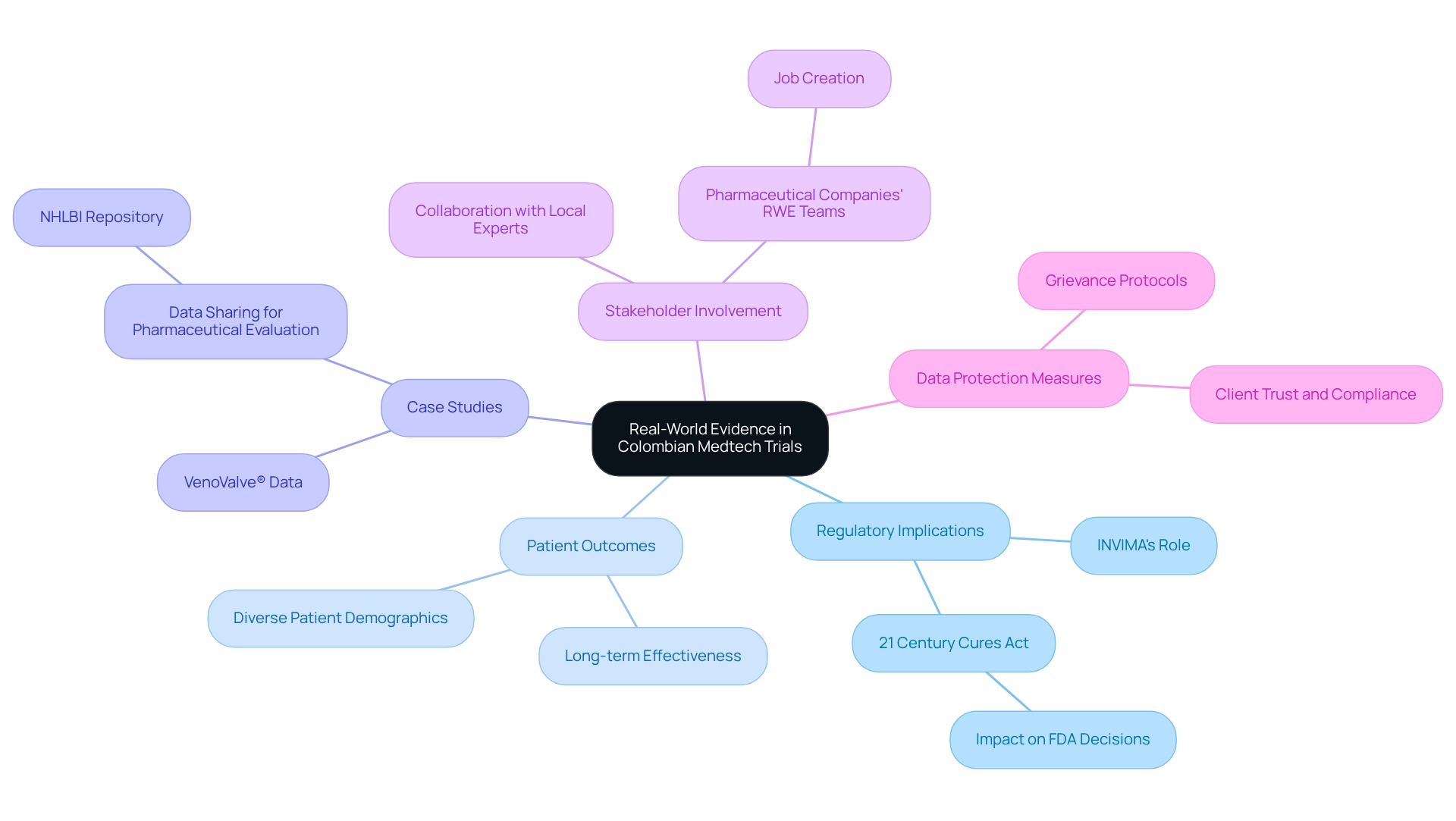
Navigating the Regulatory Landscape for Medtech Trials in Colombia
The regulatory structure for Medtech studies in Colombia is primarily overseen by the National Food and Drug Surveillance Institute (INVIMA). A comprehensive understanding of INVIMA's requirements is essential for the successful execution of clinical studies. Key steps in this process include:
- Submitting a detailed study protocol
- Obtaining ethical approval from local Institutional Review Boards (IRBs)
- Adhering to Good Clinical Practice (GCP) guidelines
Moreover, meticulous documentation is vital; this should include:
- The technical specifications of the medical device
- Evidence of preclinical testing
- The qualifications of the research team
By skillfully navigating these regulatory pathways, researchers can significantly expedite the approval process, thereby enhancing the likelihood of favorable study outcomes.
As we look ahead to 2025, the landscape of clinical trial regulations in the country continues to evolve, with INVIMA stressing the significance of early engagement and thorough documentation. Companies that embrace best practices, such as ongoing training and feedback loops, are better equipped to achieve compliance and promote innovation within the Medtech sector. For instance, the case study titled "Best Practices for Successful Regulatory Navigation in Medtech" demonstrates that early engagement with INVIMA can markedly improve the prospects for successful market entry and compliance, ultimately fostering innovation in the Medtech sector.
Additionally, the marginal tax subsidy rate for profit-making small and midsize enterprises in the country was estimated at 0.67 in 2021, reflecting a supportive financial environment for Medtech companies.
This country offers substantial cost reductions exceeding 30 percent compared to studies in North America or Western Europe, with the overall IRB/EC and MoH (INVIMA) review process requiring approximately 90-120 days. Successful Medtech approval processes in the country illustrate that a strategic approach to regulatory navigation can yield significant results, ultimately benefiting both the industry and patient care. As noted by MarkWide Research, "Their reports are thorough, accurate, and delivered on time. We value their professionalism and expertise, and would strongly endorse their services to other companies seeking dependable research." This highlights the importance of collaboration, as evidenced by the strategic partnership between bioaccess® and Welwaze Medical Inc. for the introduction of the Celbrea® medical device, showcasing the effectiveness of teamwork in navigating compliance processes. Furthermore, with a population exceeding 50 million and around 95 percent of individuals covered by universal healthcare, this country presents a robust environment for patient recruitment in clinical studies.
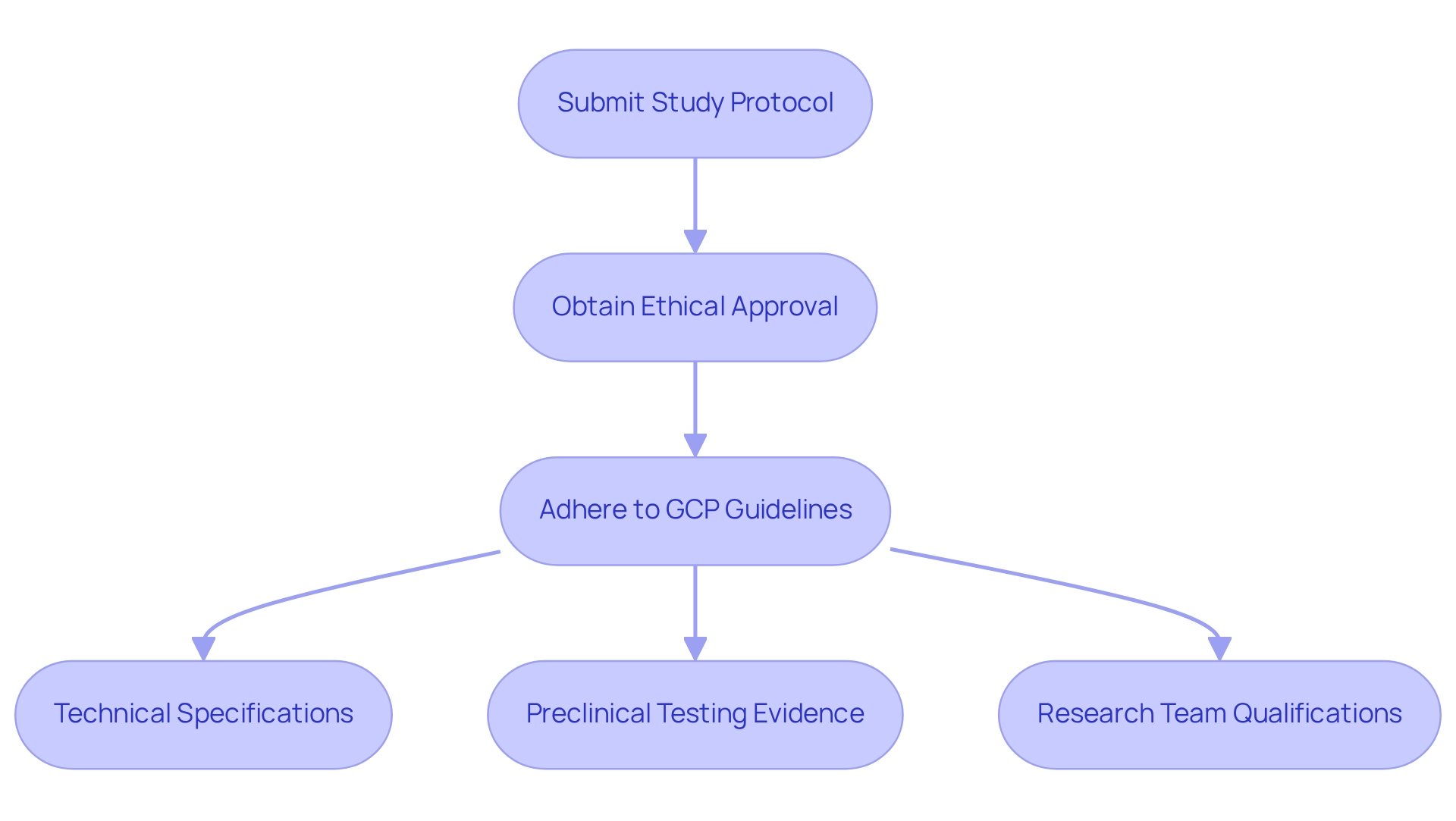
Effective Recruitment Strategies for Colombian Medtech Trials
Recruiting participants for Medtech studies in Colombia necessitates a strategic approach that respects cultural nuances and local healthcare practices. Effective recruitment strategies encompass:
- Community engagement
- Collaboration with local healthcare providers to identify potential participants
- The use of digital platforms to broaden outreach
By providing educational materials in regional languages and ensuring that study protocols are culturally sensitive, researchers can significantly enhance participant comprehension and willingness to enroll.
As Latin America's third-largest medical equipment market, Colombia represents a vital area for U.S. medical device firms seeking to conduct research grounded in real-world evidence from local medtech trials. Julio G. Martinez-Clark, CEO of bioaccess, notes, "The nation's mix of a sizable and varied population, seasoned research facilities, effective regulatory procedures, a cost-competitive landscape, and real-world evidence from Colombian medtech trials, along with a history of successful medtech research initiatives since 2010, make it a compelling option for U.S. medical device firms."
The partnership between bioaccess™ and Caribbean Health Group (CHG), announced on March 29, 2019, aims to position Barranquilla as a premier medical research hub in Latin America, supported by Colombia's Minister of Health, Juan Pablo Uribe. Outreach initiatives, including local health fairs and community workshops, have proven effective in building trust and encouraging participation. A notable case study illustrates the deployment of wMel in municipalities such as Bello, Medellin, and Itagüí, where community engagement resulted in a remarkable 95% reduction in dengue cases during the treatment period.
This underscores how effective recruitment strategies not only boost enrollment rates but also ensure diverse representation in medical studies, ultimately leading to more robust and applicable research outcomes.
Furthermore, understanding the participant recruitment landscape in Colombia is essential. Initial sample size estimates indicated that 88 test-positive cases and four times as many controls would be necessary to detect a 50% reduction in dengue incidence, highlighting the critical role of effective recruitment in achieving statistically significant results. By employing tailored recruitment approaches that resonate with the local community, researchers can enhance study efficiency and leverage real-world evidence from Colombian medtech trials to advance medical technologies in the region.
Dushyanth Surakanti, Founder and CEO of Sparta Biomedical, shared his positive experience with bioaccess® during its initial human study in South America, emphasizing the company's commitment to excellence in research. Additionally, bioaccess® offers expedited medical device research study services, focusing on Early-Feasibility, First-In-Human, Pilot, Pivotal, and Post-Market Follow-Up Studies, ensuring comprehensive support for research.

Building Strategic Partnerships with Local Stakeholders
Forming strategic alliances with local stakeholders—including healthcare institutions, patient advocacy organizations, and regulatory bodies—is essential for the success of Medtech studies in the region. Collaborations such as that of bioaccess™ and Caribbean Health Group seek to establish Barranquilla as a premier location for clinical research in Latin America, backed by Colombia's Minister of Health. These partnerships yield invaluable insights into local healthcare practices and patient needs, significantly informing study design and recruitment strategies.
Involving local investigators with established connections in the community not only boosts trust but also aids in participant enrollment, a crucial element in study success. Furthermore, collaborations with educational organizations can promote knowledge sharing and encourage innovation, ultimately resulting in more successful research outcomes. For instance, co-hosting workshops or seminars with local stakeholders can enhance awareness of ongoing studies and promote community participation, thus boosting recruitment rates.
Current trends suggest that local collaborations can significantly influence clinical trial success rates, with research demonstrating that trials involving local partnerships are more likely to achieve their enrollment goals. In the country, the steady economic growth and an aging population have spurred increased healthcare spending, further driving demand for medical devices and healthcare services. This environment presents a unique opportunity for Medtech companies to leverage local partnerships effectively.
According to a case analysis titled 'Macroeconomic Factors Influencing Medical Devices Market,' these macroeconomic factors are driving investment in medical technologies, which highlights the significance of local collaborations. Successful partnerships with healthcare organizations in Colombia have shown the potential for improved study results, as indicated by real-world evidence from Colombian medtech trials. By aligning with local stakeholders, Medtech companies can navigate regulatory landscapes more efficiently and ensure that their studies are tailored to meet the specific needs of the population. Julio Martinez-Clark, CEO of bioaccess™, highlights the significance of implementing research trials and guiding startups to enhance regional opportunities.
Furthermore, the statistic that 67% of people in the U.S. are satisfied with telemedicine appointments illustrates the broader impact of effective collaborations on healthcare outcomes, suggesting that similar partnerships in Medtech could enhance patient satisfaction and engagement. As the Medtech landscape develops in 2025, nurturing these strategic alliances will be crucial for enhancing research and improving patient outcomes.
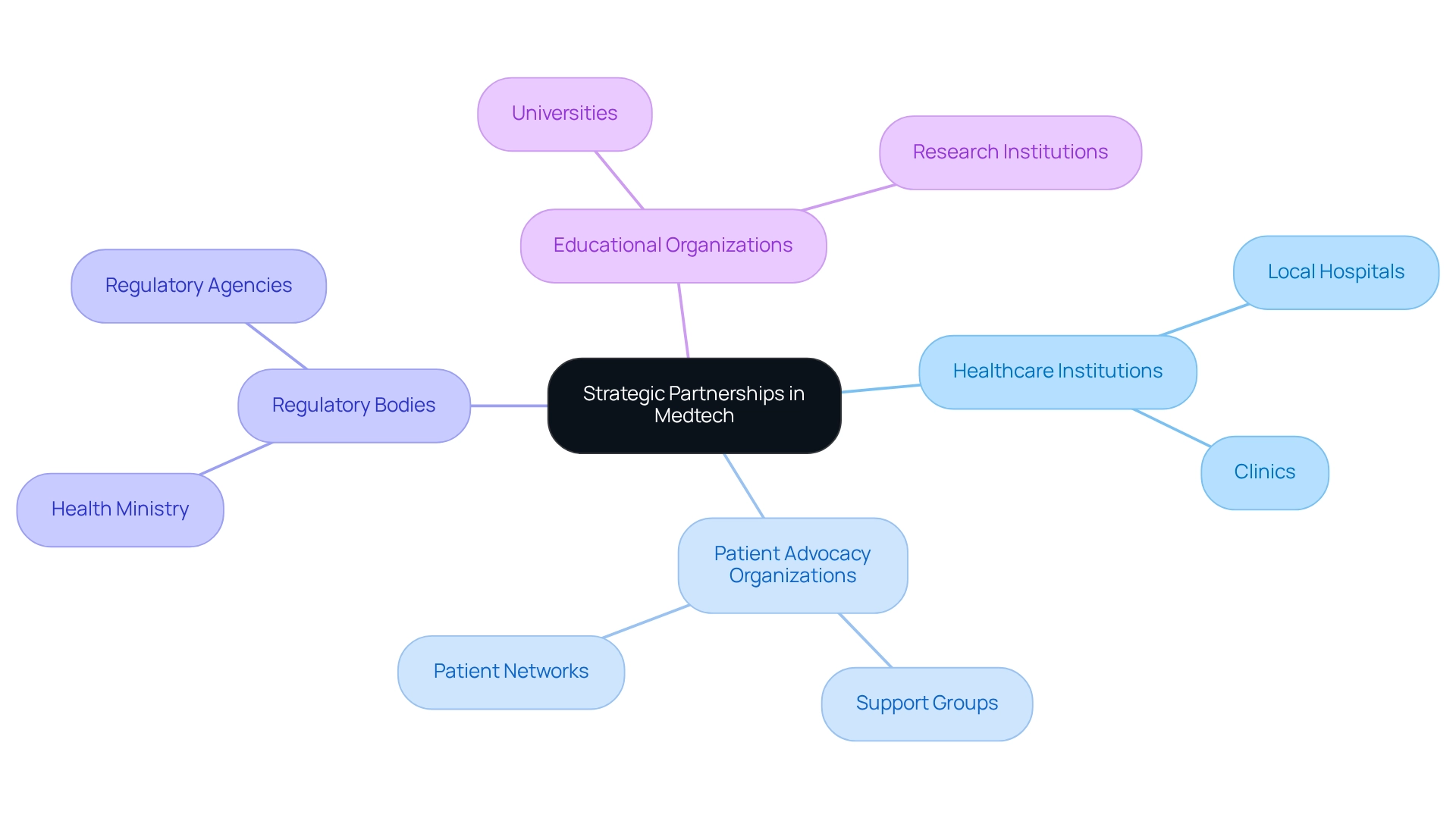
Customizing Clinical Research Approaches for the Colombian Context
Tailoring clinical research methods to suit the Colombian context is crucial for ensuring that designs, methodologies, and patient engagement strategies align with local healthcare practices and cultural norms. This process may involve incorporating traditional health practices into research protocols or adjusting eligibility criteria to accurately reflect the demographics of the Colombian population. For instance, employing local languages in educational resources and ensuring that informed consent procedures are culturally suitable can significantly enhance participant comprehension and involvement.
A pertinent example can be drawn from ReGelTec's Early Feasibility Research on HYDRAFIL™, which successfully treated eleven patients with chronic low back pain in Barranquilla. This research not only demonstrated the treatment's effectiveness but also underscored the importance of adapting research methodologies to local health practices. The procedures were supervised remotely through Zoom, illustrating flexibility and innovation in executing assessments in the region.
Moreover, the cultural aspects in Colombia, particularly the individualism-collectivism spectrum, have shown a Cronbach alpha reliability of α = 0.339, emphasizing the need for careful consideration of these factors in research design. As Juan Pimentel, MD, notes, understanding these cultural nuances is vital for successful healthcare research. By customizing research methods to the Colombian healthcare environment, researchers can not only enhance the relevance of study results but also facilitate the effective deployment of medical devices in the Colombian market.
This customization is essential for efficiently utilizing real-world evidence, ultimately improving the impact of Medtech innovations in the area.
bioaccess® plays a pivotal role in this process by providing comprehensive research management services, including Early-Feasibility Studies, aimed at navigating the complexities of the Colombian healthcare environment. By collaborating with bioaccess®, companies can ensure that their research is not only compliant with local regulations but also culturally relevant, thereby bridging the life science innovation gap in Latin America.
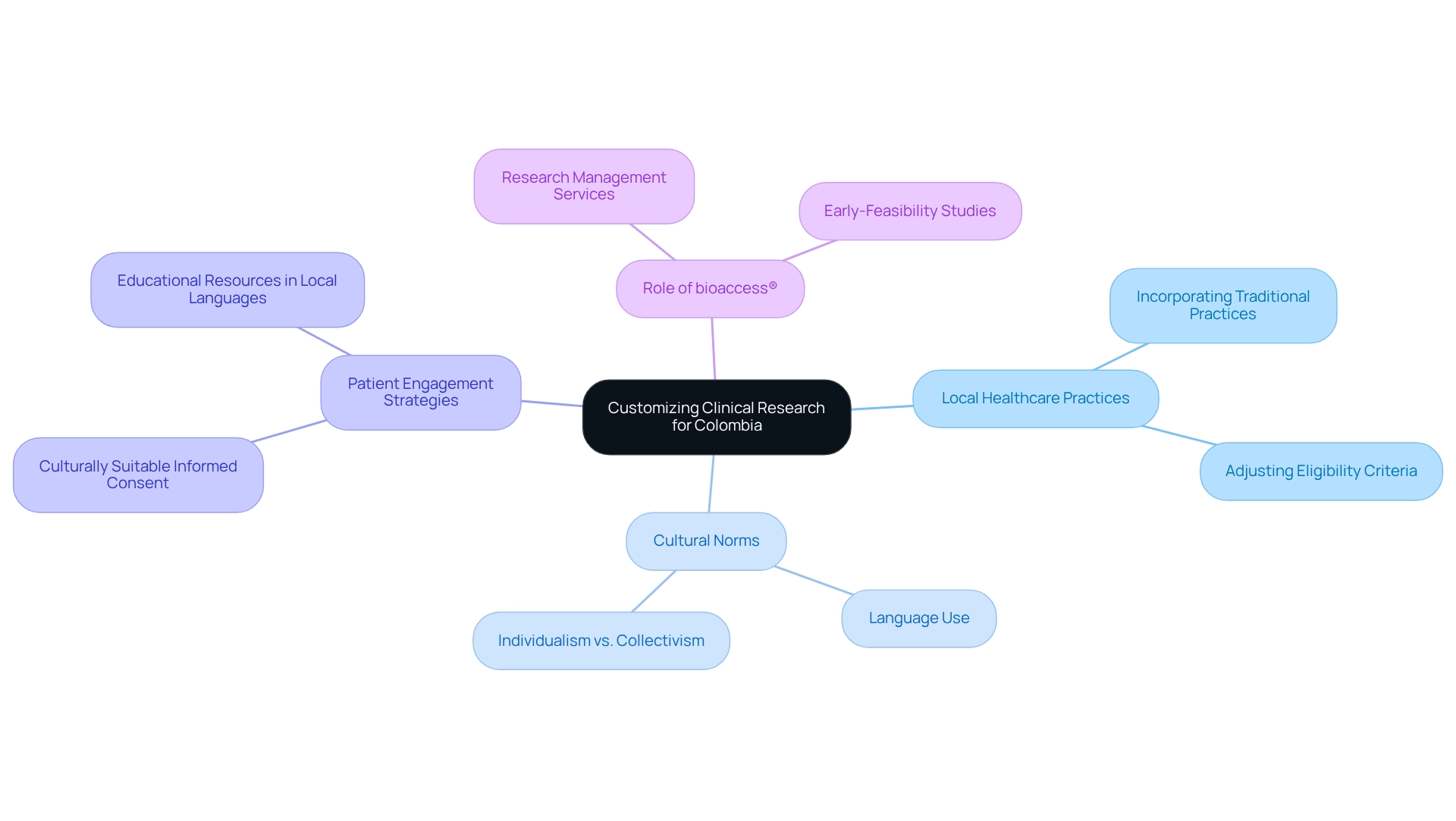
Leveraging Technology to Enhance Trial Efficiency
The incorporation of technology in medical studies is revolutionizing efficiency and data precision, particularly within the evolving Medtech environment. At the forefront of this transformation are electronic data capture (EDC) systems, telemedicine platforms, and mobile health applications, which streamline data collection and enhance participant engagement. For instance, EDC systems facilitate real-time data entry and monitoring, significantly reducing the errors commonly associated with traditional paper-based methods.
This shift not only accelerates the data collection process but also ensures a higher integrity of the information gathered. Telemedicine complements this technological advancement by enabling remote consultations, allowing participants to interact with researchers without the logistical challenges of travel. This is especially advantageous in a country where access to healthcare can vary significantly. By leveraging these technological resources, researchers can improve operational processes, reduce expenses, and ultimately elevate the quality of information collected during health research.
Moreover, real-world evidence from Colombian medtech trials indicates that the current adoption rates of technology in medical experiments in Colombia are promising, with an increasing number of research efforts utilizing EDC systems and telehealth solutions. This trend is bolstered by favorable macroeconomic factors, including government investments in healthcare infrastructure, which have fostered an environment conducive to innovation. Consequently, the availability of advanced medical technology is expanding, enabling more comprehensive and efficient research studies.
Notably, these favorable conditions have led to positive outcomes, with over a third of participants in certain studies demonstrating favorable results in depression screenings, underscoring the potential benefits of these technologies.
Looking ahead to 2025, the landscape of technology in medical studies is expected to evolve further, focusing on integrating ICT interventions that consider local aspects such as cellphone payment plans and internet access. These factors are crucial for maximizing participant involvement and ensuring the success of clinical studies. The ongoing DIADA project exemplifies this shift, aiming to establish a new mental health service delivery model in Latin America that leverages digital health for mental health interventions.
As South America's role in FDA-regulated research continues to expand, real-world evidence from Colombian medtech trials highlights the growing significance of electronic data capture on trial efficiency. Nuray Kenzhebek emphasizes, "The growing influence of South America in FDA-regulated research," which underscores the importance of embracing these innovative technologies. By adopting these advancements, researchers can not only enhance the efficiency of Medtech research but also contribute to the broader goal of improving healthcare outcomes across the region.
Furthermore, bioaccess® distinguishes itself as a leading Contract Research Organization facilitating medical device clinical evaluations in Latin America, concentrating on Early-Feasibility Assessments, First-In-Human Evaluations, Pilot Evaluations, Pivotal Evaluations, and Post-Market Clinical Follow-Up Evaluations, ensuring comprehensive management services from feasibility assessments to project reporting.
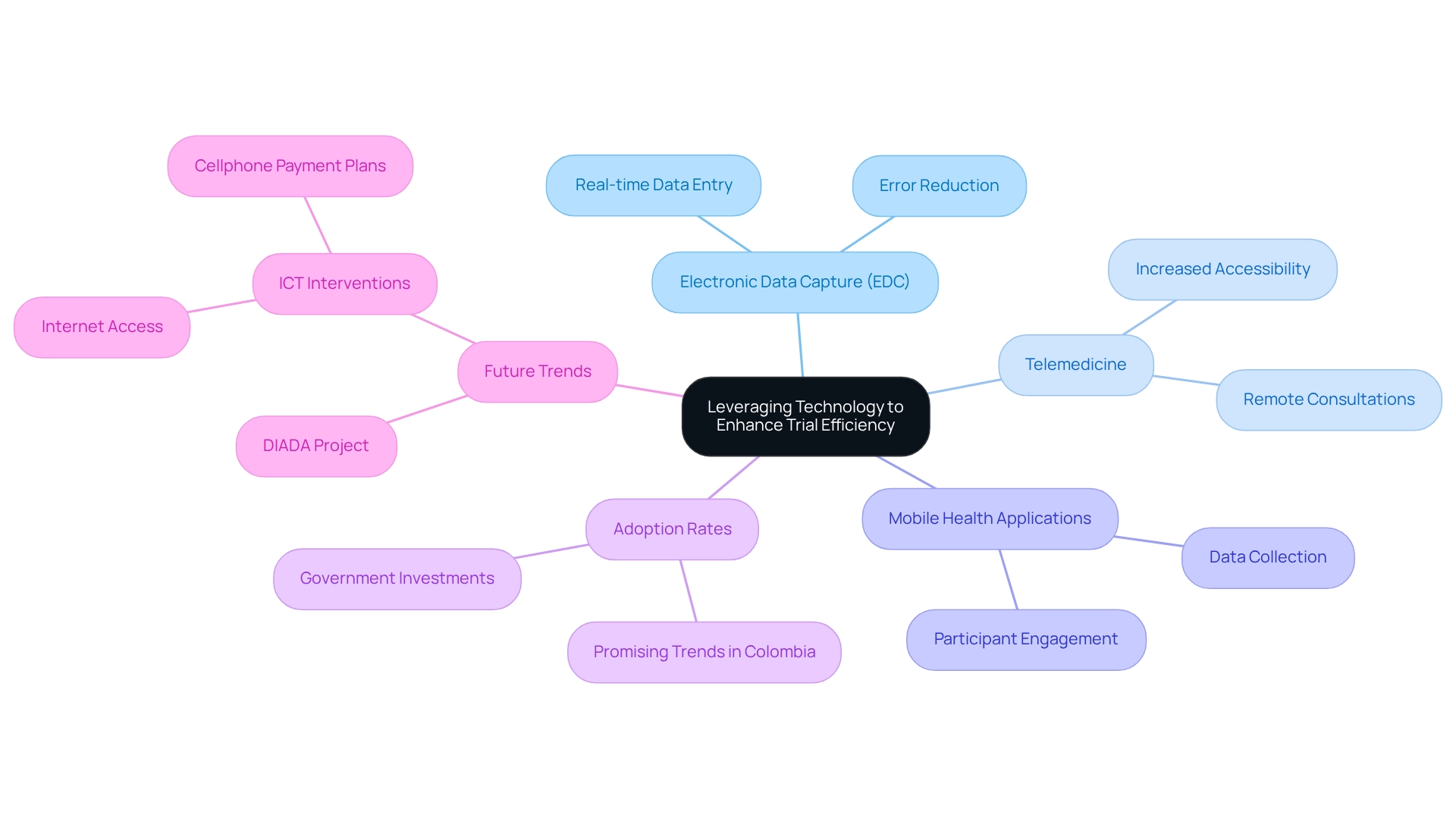
The Role of Post-Market Studies in Medtech Success
Post-market evaluations are essential for the ongoing assessment of medical devices, providing critical insights into their long-term safety and effectiveness, bolstered by real-world evidence from Colombian medtech trials. These studies are particularly important as they can uncover issues that may not have been apparent during pre-market evaluations, such as rare adverse events or long-term complications. In Colombia, real-world evidence highlights that compliance with regulatory requirements for post-market surveillance is crucial for ensuring patient safety and maintaining market authorization.
Notably, the ethics committee evaluation of research documentation typically requires 4-6 weeks, underscoring the regulatory environment and timelines that producers must navigate.
bioaccess® delivers comprehensive trial management services, encompassing feasibility assessments, site selection, compliance evaluations, trial setup, import permits, project oversight, and reporting. By systematically gathering and analyzing real-world evidence from Colombian medtech trials, manufacturers can make informed decisions about product modifications, labeling changes, or the need for additional clinical investigations. For instance, a post-market analysis that uncovers unexpected complications might lead a manufacturer to adjust their product or enhance training protocols for healthcare providers.
This proactive strategy not only mitigates risks but also builds trust in Medtech innovations, as evidenced by real-world data from Colombian medtech trials. As Jasper, a MedTech industry expert with two decades of experience, states, 'Post-market evaluations are essential for guaranteeing that medical devices maintain safety and effectiveness standards long after they reach the market.'
Statistics indicate that adhering to post-market research protocols significantly influences compliance rates in the country, with research showing that effective post-market monitoring can lead to a 30% increase in the detection of safety concerns. Furthermore, case studies highlight the importance of these evaluations; for example, NAMSA's extensive support for PMCF surveys assists manufacturers in design, execution, recruitment, and analysis, ensuring compliance with regulatory standards. A recent post-market analysis in Colombia revealed vital insights from real-world evidence, prompting a major orthopedic device manufacturer to implement design modifications that ultimately improved patient outcomes.
The role of post-market evaluations extends beyond mere compliance; they are integral to the success of medical devices in the marketplace. By facilitating continuous assessment and adjustment, these evaluations enhance the credibility of Medtech products and contribute to the overall safety and effectiveness of medical interventions, emphasizing the significance of real-world evidence from Colombian medtech trials for patient safety. Additionally, the classification of medical devices by INVIMA into various risk levels impacts their eligibility for first-in-human clinical trials, further highlighting the relevance of post-market studies in maintaining ongoing compliance.
bioaccess® is dedicated to addressing client concerns through its grievance and data protection procedures, ensuring transparency and trust in the management of sensitive information.
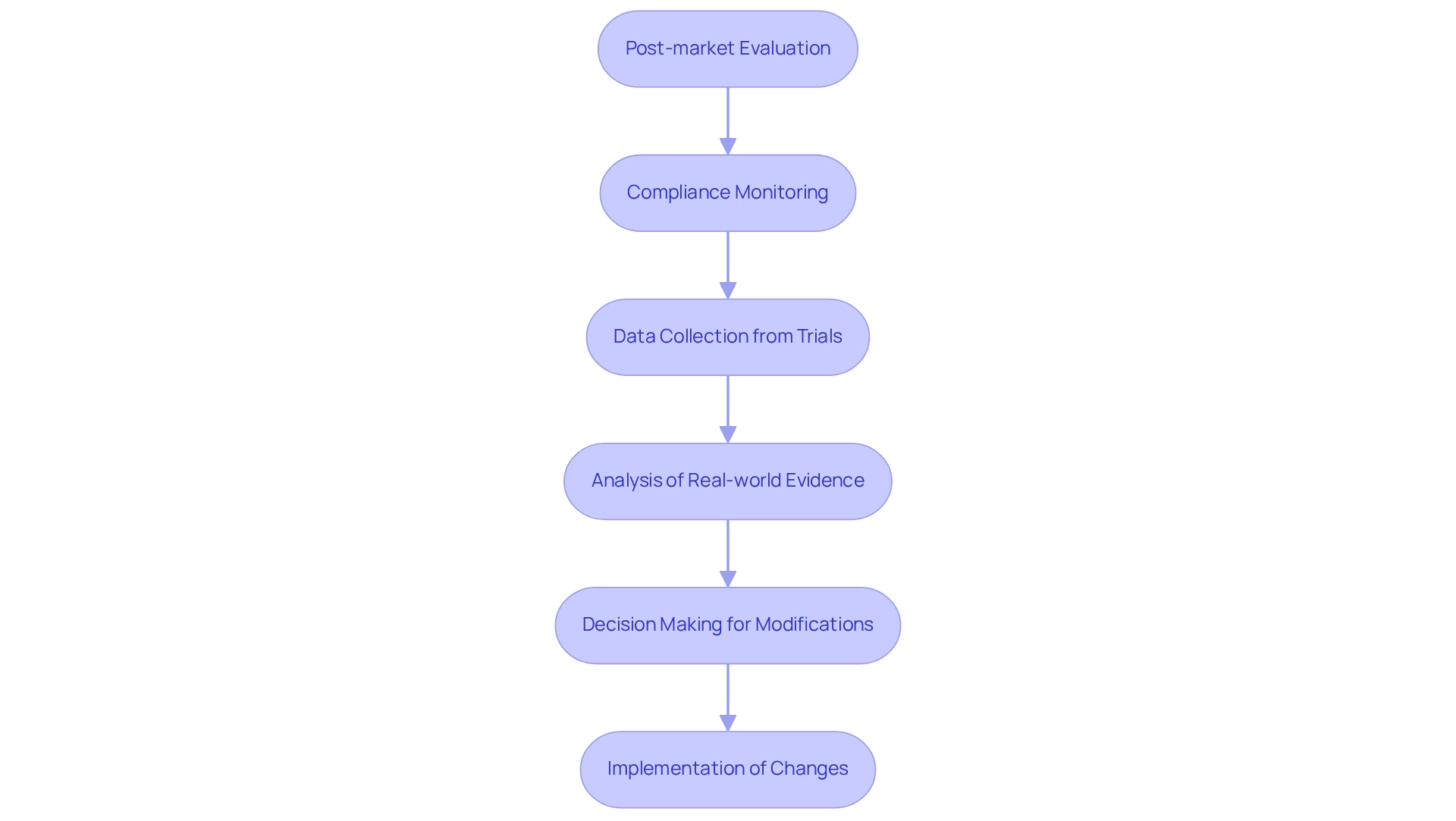
Conclusion
Real-world evidence (RWE) emerges as a transformative force in the Colombian Medtech landscape, significantly influencing the future of clinical trials and regulatory practices. By leveraging real-world data, stakeholders can obtain critical insights into the effectiveness and safety of medical devices, ultimately enhancing patient care. The integration of RWE into regulatory frameworks not only bolsters compliance but also propels innovation by informing clinical practices grounded in actual patient outcomes.
Equally vital for the success of Medtech trials are effective recruitment strategies and the establishment of strategic partnerships with local stakeholders. By acknowledging cultural nuances and engaging with communities, researchers can cultivate trust and boost participant enrollment, ensuring a diverse representation that fosters robust research outcomes. Furthermore, tailoring clinical research approaches to the Colombian context amplifies the applicability of trial findings, paving the way for successful medical device implementation.
The significance of technology cannot be overlooked, as advancements in data capture and telemedicine are revolutionizing trial efficiency and participant engagement. These innovations, alongside the necessity of post-market studies, highlight the imperative for ongoing evaluation of medical devices to ensure long-term safety and efficacy. The commitment of organizations like bioaccess® to navigate these complexities exemplifies a proactive approach to enhancing the integrity of clinical trials.
In conclusion, as Colombia positions itself as a key player in the Medtech arena, the strategic application of RWE, effective recruitment, local partnerships, and technological advancements will be crucial for advancing clinical research. By prioritizing these elements, the Colombian Medtech sector can not only enhance patient outcomes but also stimulate economic growth and foster international collaboration, ultimately shaping a brighter future for healthcare in the region.
Frequently Asked Questions
What is real-world evidence (RWE) in the context of Colombian medtech trials?
Real-world evidence (RWE) refers to information derived from the examination of real-world data (RWD), which is gathered outside conventional clinical trials. In Colombia, RWE from medtech trials provides critical insights into the performance of medical devices in routine medical settings, reflecting diverse patient demographics, treatment patterns, and outcomes.
Why is real-world evidence important for medical devices?
RWE is essential for understanding the long-term effectiveness and safety of medical devices. It informs regulatory submissions, enhances patient care, and guides future research by tracking patient outcomes after the introduction of a medical device.
What role does Dr. Jorge Hernando Ulloa play in the context of RWE?
Dr. Jorge Hernando Ulloa presented one-year first-in-human data on the VenoValve® at the Charing Cross International Symposium, highlighting advancements in vascular medicine and the importance of RWE in evaluating medical device performance.
How has the pharmaceutical industry responded to the significance of real-world data?
Recent statistics show that 90% of pharmaceutical companies now have dedicated RWE teams, indicating a growing recognition of the importance of real-world data in decision-making processes.
What is the role of INVIMA in Colombian medtech studies?
INVIMA, the National Food and Drug Surveillance Institute of Colombia, oversees the regulatory aspects of medical devices, ensuring compliance with safety and efficacy standards.
What are the key steps in executing clinical studies in Colombia?
Key steps include submitting a detailed study protocol, obtaining ethical approval from local Institutional Review Boards (IRBs), and adhering to Good Clinical Practice (GCP) guidelines. Meticulous documentation is also required, including technical specifications of the medical device and evidence of preclinical testing.
What are the benefits of conducting medtech studies in Colombia?
Colombia offers substantial cost reductions exceeding 30% compared to studies in North America or Western Europe, and the overall review process by IRB/EC and INVIMA takes approximately 90-120 days. The country also has a large population with high universal healthcare coverage, facilitating patient recruitment.
How does bioaccess® contribute to medtech research in Colombia?
bioaccess® ensures information security and client trust through robust data protection measures and offers extensive management services for research projects, including feasibility assessments, compliance evaluations, and project oversight.
What is the significance of data sharing in medtech research?
Data sharing enhances the understanding of health outcomes, as illustrated by the National Heart, Lung, and Blood Institute's Biologic Specimen and Data Repository, which has facilitated the publication of numerous articles from medical studies.
How is the landscape of clinical trial regulations evolving in Colombia?
INVIMA emphasizes the importance of early engagement and thorough documentation, encouraging companies to adopt best practices for compliance and innovation within the Medtech sector as they prepare for the future.




